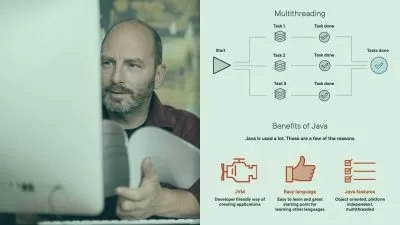Defensive Coding in Java
Andrejs Doronins
2:00:32
Description
Bugs happen, but you can certainly implement a set of practices to catch them early or even prevent them. In this course, Defensive Coding in Java, you will learn how to make your code safer and more robust.
What You'll Learn?
At the core of software development is a thorough knowledge of troubleshooting and debugging, but it is hardly "fun". It is better to prevent bugs, or at least react to them as early as possible. In this course, Defensive Coding in Java, you'll learn how to write safer and more robust software. First, you'll learn the concept of failing early and how to effectively use a variety of guard clauses in both methods and constructors. Next, you'll explore a set of very popular helper libraries that will make your defensive code more concise and elegant. Then, you'll see how important it is to return predictable and understandable values from your methods and you'll learn how to choose and implement them. Finally, you'll discover a variety of defensive techniques that are often overlooked, yet they greatly contribute to the overall software quality. When you're finished with this course, you'll have the necessary skills to write code that is more reliable and easier to maintain.
More details
User Reviews
Rating
Andrejs Doronins
Instructor's Courses
Pluralsight
View courses Pluralsight- language english
- Training sessions 41
- duration 2:00:32
- level preliminary
- Release Date 2023/12/06








![[NEW] Learn Spring Boot 3, JDBC, JPA, MySQL, MongoDB, Kafka](https://traininghub.ir/image/course_pic/40550-x225.webp)

